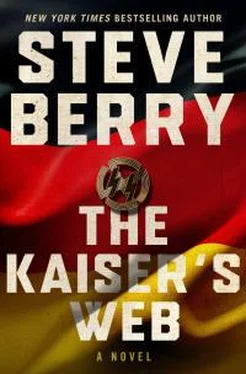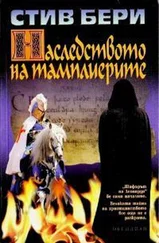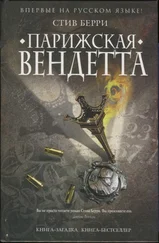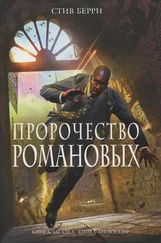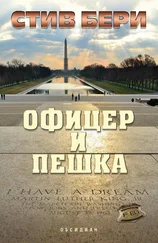“But what can he do?”
“Anti-immigration is at the core of each of those nation’s movements. As is anti-Semitism. I talked recently with a French associate. He told me the story of a local synagogue that burned, and how little was done by the authorities. Today’s hatred has taken on a new form. The perpetrators of this new type of violence are either fascists or young Muslims, who see in the local Jews a way to avenge the supposed sins of Israel. In France, as in most of Europe, society has become compartmentalized, each group to his own. The new right exploits this reality and uses it to generate fear. Ironically, some Jews in France even support the new right since they believe the current French government has done little to help them, so they turn to an alternative. Anything. Which is both foolish and dangerous.”
He was beginning to understand. “Similar to what Hitler did. Played off unemployment and the humiliation from World War One to coalesce the people behind him.”
Schüb nodded. “The European new right of today will not preach violence or genocide. No, it will be opposed to both in every form, at least publicly. Privately? That’s another matter. Instead, the policies advocated will be subtle, more mainstream. Things such as giving citizens priority for jobs over immigrants. Limiting public housing and health benefits to citizens only. Financing health care separately for foreigners so that citizens’ taxes are not used. Abandoning the euro. Expanding the police. Building new prisons. Re-instituting the death penalty. Rewriting textbooks to preserve a so-called national memory. Requiring everyone to participate in patriotic displays. Even establishing a national language and religion. These are the directions our new despots will head and the people will willingly follow because, after all, who could argue with any of those.”
What Schüb was saying made sense.
“The recent decline of the European Union has helped these reactionaries. Each EU member nation has deep cultural roots with strong nationalism. And none of those include Islamic elements. On the contrary, European history is replete with instances when Islamic culture has been outright threatening. Spain and Portugal were occupied for centuries. Eastern Europe throughout history faced a constant threat from an Islamic invasion. So a unified, strong Islamic presence within Europe will never be allowed. And the new right uses a fear of that re-emergence quite effectively.”
“Bormann taught this to Pohl?”
“That and much more. Bormann was a brilliant strategist. He understood the art of mass manipulation. He also appreciated the role that timing plays in politics. In fact, as he many times said, timing was the most crucial element of all.”
On that he could not argue.
“It’s time we go to Germany,” Schüb said. “We need to speak with Theodor and Marie Eisenhuth. But there is one more thing we must do first.”
He stared at his host.
“There is a place. In the Austrian Alps, near the German border. A house once owned by Bormann, now titled in one of my aliases. We must stop there on the way.”
“Are you going to tell me why?”
“I prefer to show you.”
CHAPTER SIXTY-FIVE
LÖWENBERG
TUESDAY, JUNE 18
10:00 A.M.
Pohl eased open the heavy oak door and entered the corner tower. Its outer walls faced southeast and dated from the 15th century. Each of the four stories within the tower contained a room, the uppermost chamber once the castle’s armory. He’d arrived back home a few minutes ago from his trip to Munich. He’d called ahead and arranged the meeting, stopping only momentarily in his study before heading to the tower.
He climbed the spiral stairs, past archer slits, and entered the top-floor room. He shut the door behind him and bolted the latch.
Josef Engle stood on the far side beside a Gothic fireplace. Weapons and armor no longer constituted the room’s décor. Now the half-timbered walls were bare, the space used mainly for storage. An unearthly green light filtered in through dirty opaque frames. The air was cool and laced with the pall of time and age. He crossed the gritty flagstones, withdrew from his pocket the pistol he’d retrieved from his desk, and pointed the barrel at Engle’s head. “I need to know why I should not shoot you dead.”
“Because whatever transgression I have committed is minimal compared with your need for my services.” His associate showed no emotion.
“You smug bastard. I told you to kill Vitt, Malone, and Jan Bruin. Instead they are all alive and pursuing me.”
“Vitt and her partner are dead. I was there when the Chilean fighter reported blowing up the house, with them inside.”
The report came matter-of-factly and still with no concern. He kept the gun level, his finger on the trigger. “He was wrong.”
“You have seen them?”
He caught the surprise in the question.
“Vitt and Bruin in the flesh. Tell me what happened with Jan Bruin. The truth.”
“He was waiting for me. I did not agree with your decision to start with. In the end, my assessment was correct. Bruin anticipated our move and was ready. He should have been left alone. Instead we simply roused him from his self-imposed sleep.”
“I don’t need you questioning my orders.”
“I’m not. Simply noting that the decision was misguided. Bruin specifically sent me back to report his death to you, so he would be left alone. Since I agreed with that course, I saw no reason not to comply.”
“Bruin lied. He played you. He is here, in Germany. Which is precisely why I ordered you to kill him.” He motioned with the gun. “You are not indispensable. There are many willing to perform your tasks.”
“But none you could recruit, school, and train in the time allowed.”
He lowered the weapon. Engle was right, he wasn’t going to shoot him, no matter how much he might want to.
Not right now, at least.
“The deceit with regard to Bruin was unfortunate,” Engle said, the tone conciliatory, “but I thought he sounded sincere. He had kept what he knew to himself for a long time. There was no reason to doubt that he would continue. Besides, he was waiting for me with an armed guard. I had little choice but to comply.”
“You could have told me the truth.”
“That is not what you wanted to hear.”
He whirled the gun up and fired. The bullet raced past Engle’s left ear and ricocheted off the coarse stone wall. Engle never moved and the man’s frigid nerve chilled his own resolve.
“Everything I planned has failed. Vitt, Bruin, Malone, even the old man Schüb, are here.”
He was not accustomed to being cornered and did not like the feeling.
“Schüb is alive? What has happened?”
He lowered the gun and told his associate of the confrontation at the Munich court theater. “Eisenhuth was probing to see how I would react. But I gave her little.”
“She was baiting you for a response.”
“She was telling me that we are at a stalemate where we can each destroy the other. But we’re going to give her a response. Immediately. Before she has time to prepare.”
“That is exactly what she wants you to do.”
“Thanks to your mistakes, I don’t have a choice anymore. It’s either her or me. This is now a battle to the death. I assume you have people willing to handle the matter and shoulder the responsibility.”
“Our Chinese allies are quite anxious to intercede. I told you that months ago. They detest Chancellor Eisenhuth. She routinely sides with the Americans against them, so they have repeatedly offered to assist.”
China was Germany’s largest trading partner. Nearly two hundred billion euros last year alone. Their relationship dated back to the first Sino-German treaty in 1861. High-level diplomatic missions were commonplace, as was mutual cooperation. But their relationship with Eisenhuth had become increasingly strained. So much that they’d reached out and privately urged a change in leadership, one they were willing to help make happen whether that be with money or with in-kind services. Pohl had dealt with Beijing countless times while in the Bundestag and always found them negotiable. But he’d resisted being beholden to them, settling instead on a grandiose scheme of using his South American connections to reveal the financial web that would ruin Eisenhuth.
Читать дальше
